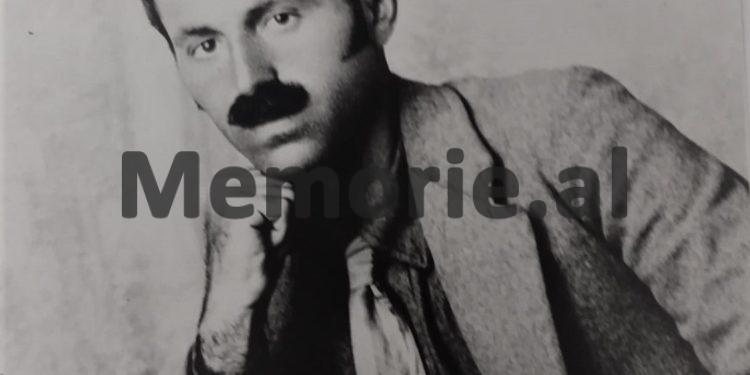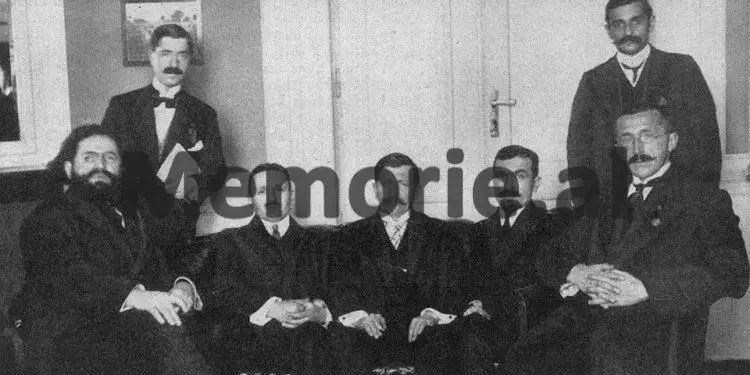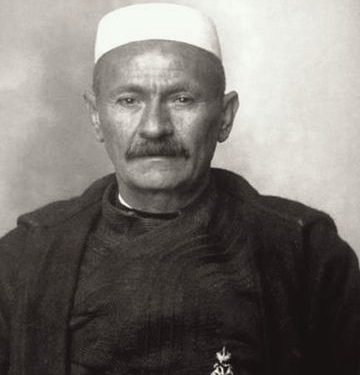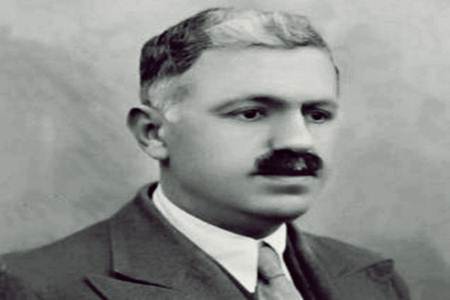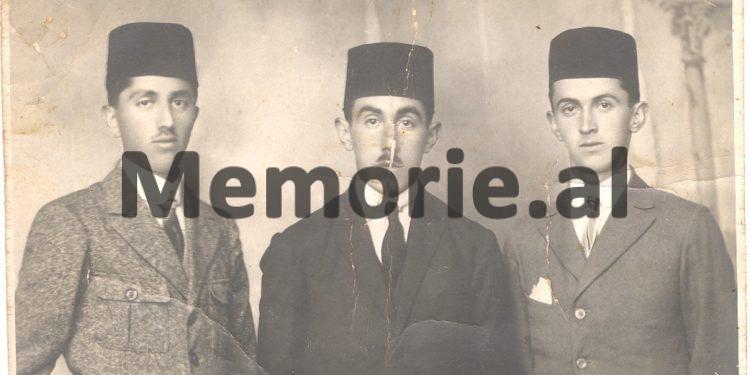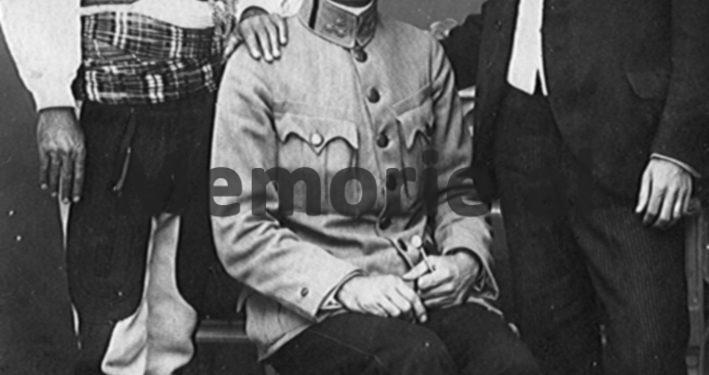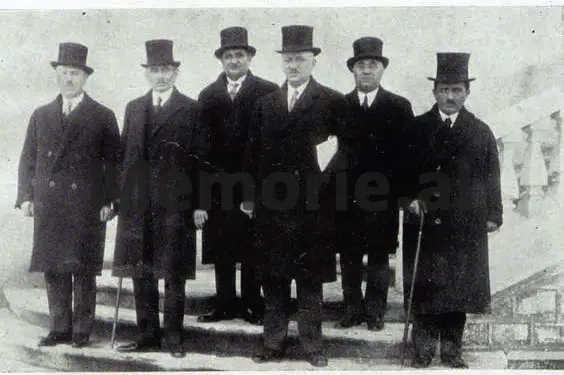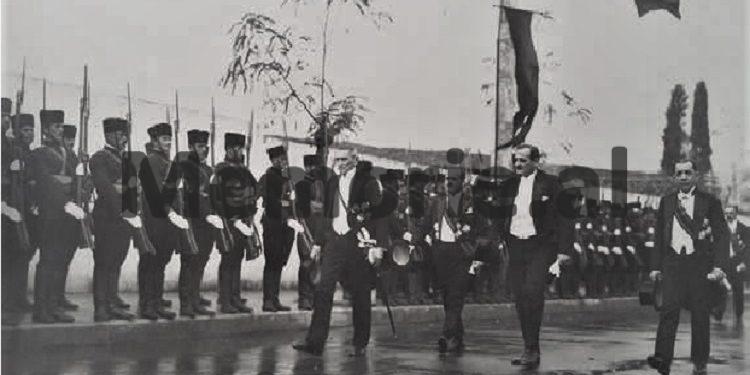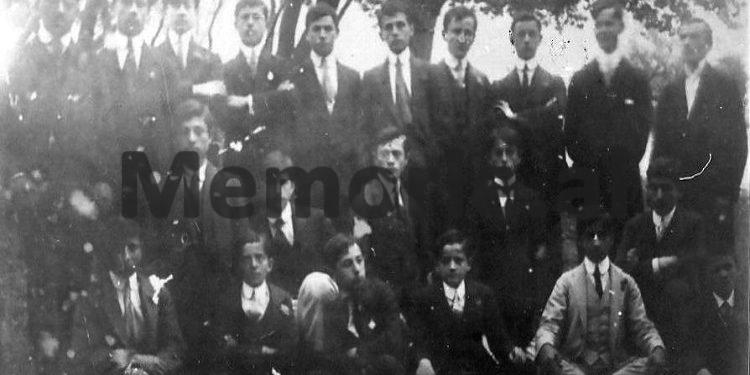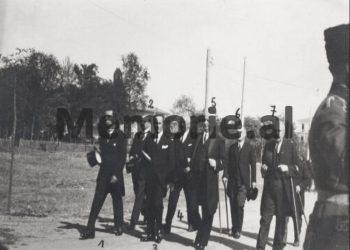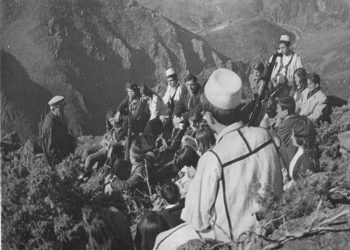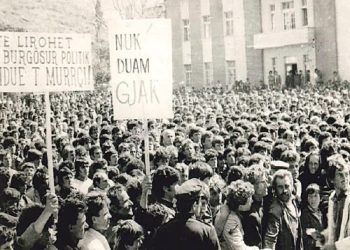By Hamid Gjylbegaj
Second part
– Biographical memories of Hamid Gjylbegaj –
HISTORICAL EVIDENCE 1912 – 1925
Memorie.al / I were born in Shkodër on March 1, 1888. I received my first lessons in my hometown, in the Turkish, Mejtepe and military schools. I finished the last year of the military gymnasium in Manastir, from where I went to the Military Academy of Turkey, in Istanbul. After finishing school, I was appointed a lieutenant in the Fifth Corps of the 13th Division of the 38th Regiment of Thessaloniki, where I served until October 1912. During this time I fought in Kumanovo, Prelep, Bitola (where I was wounded twice) and finally in the Castle of Ioannina, in Bizhan, until February 28, 1913. For military actions during the war, as a distinguished officer, I was prematurely promoted to the rank of lieutenant. I entered the military history of the Balkan War as the first officer in the world to discover, on the basis of ballistics science, that the German 7.50 mm field automatic cannons, compared to the French 7.50 mm. were inferior. It was a technical mistake by the Germans, who made the cannon barrels 25 cm. shorter than the French cannons, which later, in the First World War, was also discovered by the Chief of Staff, General Ludendorff. My report on this matter is in the military archives of Turkey. With the surrender of the Ioannina Castle on March 6, 1913, the entire Turkish high command, of which I was also a part, was taken prisoner of war. As a prisoner of war, I spent seven and a half months on the island of Zanta (Zaqinthon). With the signing of the Peace Treaty, in October 1913, I moved to Istanbul.
Continues from the previous issue
The departure of Montenegro from Shkodra and the entry of Austria (year 1916)
With the departure from Shkodra of Montenegro, Austria entered on January 17, 1916. The Austrian political officer, Lieutenant Tashi, announced an order in the Municipality of Shkodra, through which he demanded the appearance in the municipality of persons who had graduated from higher schools. On this occasion, we appeared: doctor Saraçi, lawyer Qazim Dani and I, as a military academician.
After I showed him the requested document, the Austrian officer proposed that I take over the direction of the Shkodra Police. I told him that I was not a police officer, but an active duty officer. After he insisted, I asked for time until some of the Albanian officers who were in Montenegro returned. Then we would decide after seeing how Austria would consider Albania. Annoyed with my attitude, he kicked me out.
That’s how I broke away from this administrative branch. In my place was appointed “official officer”, Director of Police, Hilë Mosi, and as official lieutenants, Ymer Ruzhdia – Ulqinaku, and Ymer Kopliku. The next day, the command of the Austrian army called me and asked me for my opinion regarding the technical-military actions in Albania and they forced me to lead their troops. I left with the Shkodra Municipality cart and arrived the troops at Kakariq Mountain. Then we arrived in Lezhë and from there we left for Krujë, where we disarmed the gendarmes of Esat Toptan. Here we joined other forces, among which Murat Bey Toptani had also arrived.
The commander of the Austrian army was Haersler.
From here, I returned to Shkodër, where I found the comrades who had been released from captivity in Montenegro, as well as the volunteer officers who had gone to Austria. All of us, together with Luigj Gurakuqi, gathered at the house of Fejzi Alizoti, in the Catholic neighborhood “Bardrej”, where we discussed the issue of the uniform of Albanian officers. The difference was made by putting red and black stripes and the initials “F.I.” (Which meant: Franz Joseph I)? I opposed this action. I proposed to put “W-I” in the cap, which means Widi I. However, I did not find support for this action.
The Austrian command, after consulting with the general command, forced us to capture the “FI” sign. In conversation with fellow officers, I proposed that before we were put in the service of Austria, we should make a contract with them, to protect our rights. This was not done because the comrades who came from Austria said that they had once sworn for the king and could not ask for such a thing. Also, Fejzi Alizoti and Luigj Gurakuqi did not support the political idea of a social contract with Austria. So we remained subject without any rights, under the rule of the Austro-Hungarian Empire.
After taking me into service, Austria sent me to the tower of Luma, together with an Austrian captain, Negrep, to establish the administration of Luma, Has, Peja and Dibra. My service in this position was as an advisor to the commander of this district. The task was to regulate the administration, the gendarmerie and to issue ordinances of the Austrian administration in Albania.
In addition, we had the task of determining the administrative borders between Montenegro, Serbia and Bulgaria.
The Austrian command in Albania was also involved in the investigation of the events that took place in this province. As we have said before, Austria, before the occupation, had collected clothing and weapons to use against Serbia and Montenegro, when the military movements began.
According to the investigations we did, it turned out that Elez Isufi had also participated in this war in the province of Dibra, in Reç e Dardë, where he had destroyed a division of Serbia. Elezi himself showed us in front of his house, the graves of 573 Serbian military forces, as well as a large amount of weapons, including two machine guns. For these actions, Austria decorated Elez Isuf with the “Officer’s Cross” medal of the Order of Franz Joseph.
On the other hand, Bajram Curri had fought along the Drin River, at the Vezir Bridge, and had destroyed another division of Serbia. Although the Austrian command in Albania had proposed a decoration for Bajram Curri, it was not given to him because, as it seems, the Austrian governor of Montenegro was against the decoration of Bajram Curri, whom he presented as a brigand.
This was also seen in the case when we asked Bajram Curri to come from our side, he (the governor) was barely persuaded to allow him to pass. During the checks we did in different places, in Zyme village of Hasit Gjakova, we found that the Austrian captain, the local friar, Pashko Prela and the director of the primary school, had become the main administration of the country, administering 13 Muslim villages. By making great wastes, they had caused discontent among the people. For this reason, Captain Negreb took measures. He demoted the Austrian captain, and transferred him as a simple soldier to Galicia, while he sent the friar to Montenegro.
After I was bored with the administrative work, in order not to be compromised in the people, I decided to leave Kullat e Luma and applied to go to the Aviation School, Vinermajshtag. In response, they told me that I had to attend the Reserve Officers’ School, which had opened a while ago in Shkodër. I joined the school as a listener. After finishing school, I was sent to the war front in Berat. While the war continued, together with the allies we formed Albanian detachments to come to the aid of the army.
In Berat
In addition to the company I had in Berat Castle, since I knew German, I was also assigned to the War Information Commission. The reports that came from the war front written in Albanian and Turkish, I translated them into German. One day a secret order arrives from Berlin. He ordered Austria to attach the slogan “Self-Government of Epirus” to the Albanian detachments formed in Epirus.
After this order, the Austrian officers talked with the Greek officers to temporarily suspend the war, for a political opportunism that the Kaiser of Germany was doing with his nephew Constantine of Greece, whom he was trying to attract. As Albanian officers, we were closely guarded. I gathered my fellow officers at the house of Sali Nivica, who had the function of general secretary of Berat Prefecture. The prefect, Hajdar bey Kolonja, also participated in the meeting, whom the Austrians killed in Gjojc after four months.
At the meeting I showed him the secret order that had come from Berlin and asked everyone to act as they wished. Meanwhile, I proposed to Shefqet Korça that we desert and leave the side of the allies, knowing that he was a career officer of the front and had with him the amount of 600 gold napoleons and 900 serm crowns, which he paid as salaries to the squads that operated at the front. Shefqeti refused. Then I resigned and decided to return to Shkodër, together with Ceko Leskovik. On the way to Shkodër, the latter invited me to spend the night at Sheh Ibrahim Karbunara’s Teqe. On this occasion, we talked with the sheikh about the political situation of the time.
Back in Shkodër
By chance, in Shkodër, I met Captain Negrepin, who, seeing me in civilian clothes, learned of my resignation. Since he knew me well, after we had worked together for four months in the River Towers, he intervened with the Consul General of Austria, Kral, telling him that this was a man, a politician, and either he should be taken into service or he should be exiled. Consul Kral called me and proposed to me to enter military service again, which I at first opposed, telling him that I could not give my life for Austria, without having any direct reason.
I proposed that he appoint me as a German teacher. He gave me a recommendation for Luigj Gurakuqi, who at that time was the General Director of Education. He appointed me principal of the primary school in Perash. However, before starting work, Negrepi changed his mind, intervening with the Consul, for my appointment in the military branch, as definitive in the first Albanian battalion that was in Shkodër.
Representative of Albanian officers in Vienna
A good part of the Albanian officers, not being able to perform their duties properly, were despised by the Austrians and their rights were denied by not being promoted and not being paid for food and clothing. To claim their rights they appointed me to go to the superior army in Vienna, as their representative, giving me 2000 crowns, for traveling expenses.
After meeting with the military dignitaries of Vienna, I assured you comrades equal rights with Austrian officers.
In addition to the military issues, I presented four other points related to the civil administration. First, I told them that at the time when the Austrian consulate in Shkodër was left without money, you had borrowed 600 napoleons of gold from two people from Shkodër, and after the arrival of Austria in Shkodër, you paid them at a lower rate.
Second, the nineteenth Austrian corparmata had intervened near the finance directorate of Shkodra, to obtain land for the establishment of the Rozafa Church, forcing it to make a deed in favor of the Church, for 1,283 square meters. This action was illegal because it was not up to Korparmata to intervene in civil administrative matters. Third, I protested about the knife that was stabbed in the mosque, in the Çele field, in the presence of the gendarmerie present in the mosque, and that this constituted a fault for their administration.
Fourth, the Austrian army in Myzeqe paid a buffalo 10 paper crowns, 1 cow 5 paper crowns, and 1 sheep 2 paper crowns. This was a robbery done to the Albanian people by them. For all these issues, after a commission of three people came from Vienna, the necessary measures were taken. And Austria’s administration in Albania saw improvements everywhere.
After the departure of Austria, the Albanian state had a surplus of 33 million serm crowns in the economy.
The activity of the “National Wing” and the “Committee” of Kosovo
At this time, the “National Wing” activity started again. Since the Kosovo Committee was also formed in Shkodër, under the chairmanship of Hoxhe Kadri – Prishtina, the unification of the two committees took place and Hoxhe Kadria remained the general chairman. The main task of the Committee was to unify opinion and save the 1913 borders, openly fighting the decision of the Secret London Treaty of 1915.
The Allies had promised Albania to Italy in order to withdraw it from their side. For this matter, the limping Englishman, Eden, came from England and met with Abdi bey Toptan, whom he asked to go and demand the annulment of the treaty of 1915. For this purpose, Eden sent a letter to Aqif Shah Elbasan, letter which Aqif Pasha himself told me. Later, the Pasha sent this letter to Noli for political clarification, but since Noli was with the Russian political line, he did not take this letter into consideration at all.
The national propaganda of the committee was carried out through the newspaper “Populli” published in Shkodër by Mustafa Qulli with Sali Nivica and other members. At this time, Luk Luka – Minister of Education in the temporary Albanian government of Thessaloniki, headed by Esat Pasha Toptan, comes to Shkodër, bringing with him a platoon of letters written in Turkish by the secretaries of Esat.
Among them was a letter written in Turkish by Esadi, who asked us to make a proposal to Sulçe beg Bushati, to participate in the temporary government of Thessaloniki, headed by him. It was also requested to support Esadi and accept him as the Prince of Albania, which Esadi himself requested at the Peace Conference in Paris, through a memorandum that he submitted to the Conference, a booklet written in French “Memuar sur l’Albani”.
I was informed by Maliq Gjyli – Minister of Trade of Esat, that we would have Luk Luk under control, as it was imposed by Serbia and they did not trust him.
The meeting in Belgrade with Nexhip Bej Draga
I was charged with a secret mission by the committee to go to Belgrade, to invite Nexhip bey Draga to come to form the Albanian state. Also, I was tasked to go to Thessaloniki, to receive Esat Pasha’s program. Nexhip bey Draga did not accept the proposal I made to him to come to Albania to establish the Albanian state, suggesting Mehdi bey Frashëri to me as the founder of the Albanian state.
He was of the opinion that the government should first be established in Tuscany, as he considered them more developed than us, then in Central Albania, and finally in Shkodër, together with the Catholic Clergy. After forming a general coalition and consolidating the Albanian state, it was necessary to think about the union of Kosovo and Chameria. In the conversation with Nexhip bey Draga, he told me that I had to leave as soon as possible because, according to him, the Serbs did not know politics and I was in danger of being killed. He also advised me that educated Albanians, few in number, like me and my friends, had to be careful not to be killed, and we went in vain.
Because, according to him, the majority of the Paria of Albania were used to fat salaries from the coffers of Turkey, and now they coveted the poor coffers of Vlora and Durrës, there was a danger that they would drown Albania. Wanting to explain things to me better, he said: “Do you know how Major Hysen begs Fusha is?” – I told him no. He told me that Hysen Begu went out in the afternoon to Gomsiqe and cut the road Shkodër – Prizren, cut the telegraph wires. Consulates protested about this event in Istanbul.
Sultan Hamidi, after the investigations he made, decided that Hysen beg Fusha should become a gendarmerie major, to guard these same roads. When Hysen beg Shazi found out about this, he also came out and cut the road on the mountain of Kakarrić, cut the telegraph wires, stopped the mail. Consul protests again. Then the Sultan also gave him a “grazing” vest, making him also a gendarmerie major to guard the Shkodër – Lezhë – Tirana road. At this time, Ibrahim bey Sokoli, who had been in Istanbul to see Tahir Pashë Dragoviqi, comes to Shengjin by steamer, goes ashore and asks: “What’s wrong with Shkodra?”.
They tell him that Hysen Beg i Fusha and Hysen Beg Shazi have become gendarmerie majors. This gentleman, without coming to Shkodër, returns to Istanbul with the same steamer to look for a place to eat, because it was a bigger house. The sultan also promoted him to colonel. In Stomboll, Preng Pasha, Gani bey Toptani and Esat Toptani, lived in the “Bejoll” neighborhood of Istanbul. But they were shooting guns for hours, getting drunk and making noise, annoying Sultan Hamid, down in “Dollma Bahçe”.
Then Sultan Hamid sent Preng Pasha into exile in Anatolia, Esat Pasha was sent as a gendarmerie colonel to Ioannina, while Gani bey Toptan, who had fallen in love with the Grand Vizier’s daughter, killed her with the girl’s brother. So Sultan Hamid escaped from this trouble he had on his head.
In Gjakovë, Nexhip Bey continued to tell, rifles are fired between Riza beg Kryeziu and Bajram Curri, and the Prizren-Skopje post office is broken. Like the first ones, the Sultan promoted them; Riza Beg made him a major, Bajram Currin a captain, Hysni Currin a captain. Nexhip Begu continued to tell the time when he was a deputy in the Parliament of Turkey, together with Hasan Pristina, Ismail Bey Vlora.
We insisted on Albania’s rights, autonomy, culture, language and civilization, but the Young Turks made propaganda among the people of Kosovo, which they raised against us. People come to Kaçanik and telegraph to Istanbul, asking that a person named Nexhip, who does propaganda there, we do not know at all as our deputy.
One day while sitting in the “Balkan” cafe in Belgrade with Nexhip Beg, I spoke to him about the bravery and manly death of Isa Buletini, who was killed by the Montenegrins. (Prepared by Dr. Shefqet Deliallisi) Memorie.al
The next issue follows




